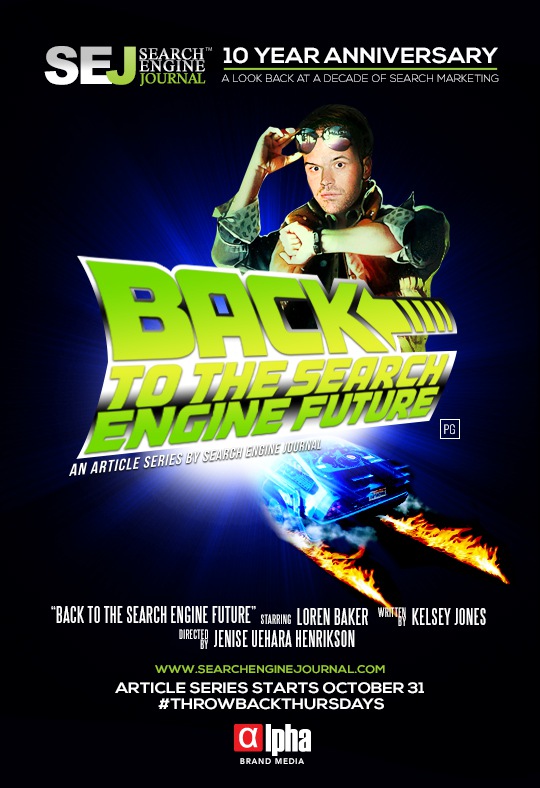This is a series that takes a look back at every year that Search Engine Journal has been documenting the world of search marketing.
Search Engine Journal has been writing about the search marketing game for the past 10 years. To commemorate this milestone, Loren Baker, founder of SEJ, got in the time machine with me and travelled back to 2004: when we used Mapquest to get around and Kazaa to download Britney Spears onto our iPods.
From Google Trends’ Top Charts, Most Searched Athletes: October 2004 vs October 2013
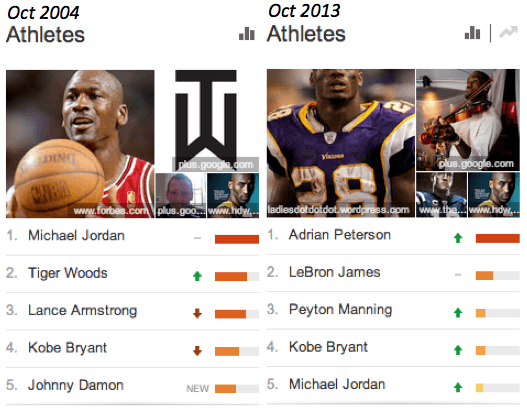 Kelsey Jones: Michael Jordan is still in the top 5, nine years later! Impressive. Must be all the Hanes ads (and the fact that he was the best basketball player of all time). And Kobe is still up there. Ironically, Dodgeball, the most well-known (and maybe only) dodgeball movie of all time, was also released in 2004, which Lance Armstrong had a cameo in. Now, we are all burning our Livestrong bracelets.
Kelsey Jones: Michael Jordan is still in the top 5, nine years later! Impressive. Must be all the Hanes ads (and the fact that he was the best basketball player of all time). And Kobe is still up there. Ironically, Dodgeball, the most well-known (and maybe only) dodgeball movie of all time, was also released in 2004, which Lance Armstrong had a cameo in. Now, we are all burning our Livestrong bracelets.
Loren Baker: What’s interesting here to me, besides Kobe somehow managing to stay relevant over the course of a decade, is that the NFL has become much more of a digital sport than the NBA over the past 9 or 10 years. I think a lot of that has to do with the popularity of watching online highlights, games and also Fantasy Football of course.
February 2004: “WebmasterWorld Announces Search Engine Conference”
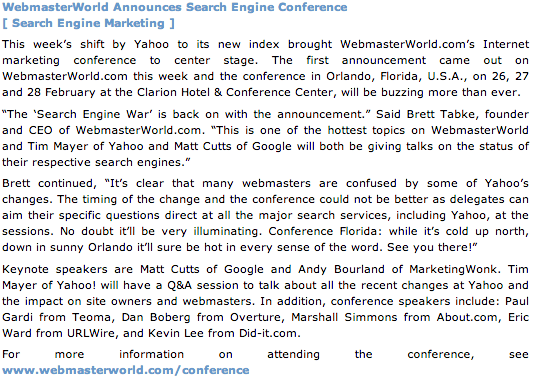
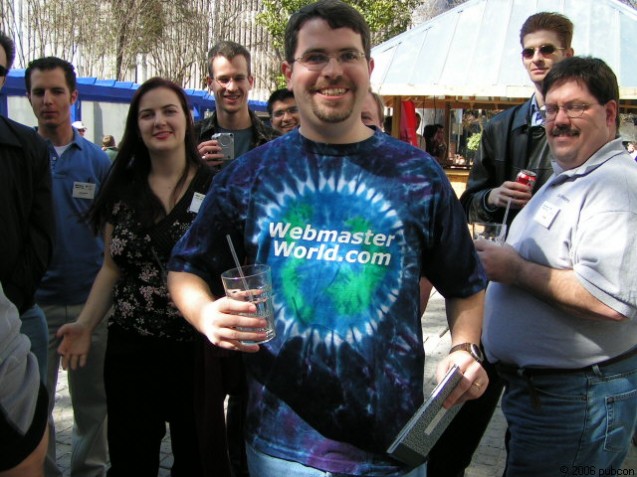 Matt back in the day at WebmasterWorld 2004 in Orlando. The conference would later be dubbed “Pubcon”. Image credit: Pubcon
Matt back in the day at WebmasterWorld 2004 in Orlando. The conference would later be dubbed “Pubcon”. Image credit: Pubcon
KJ: Search engine conferences are one of the best ways to stay relevant in the industry, as well as meet a ton of great people who geek out about algorithms as much as I do. What do you find are the best conferences to attend each year?
P.S. Matt Cutts looks almost exactly the same. Maybe he’s more involved in Calico than we all know.
LB: Wow, what’s amazing about this is if you asked most of the Pubcon 2013 attendees where Pubcon got its roots, very few would say out of a forum. Also, the other major conference series in the search space; SMX and SES (ClickZ) are more so extensions of event & expo companies or established news sites. It’s great to see that Pubcon, even after the Internet Marketing Ninjas crew bought the WebmasterWorld.com site, is not only still thriving .. but growing to more regional locations and expanding its events.
In a decade where we’ve seen the consolidation of conferences, the growth of smaller events, operations becoming more expensive (yada yada); seeing what Brett Tabke and the team at Pubcon built from a grassroots effort is amazing. It’s also a great testimonial to the power of audience & community.
April 2004: “Search Engines Influence Consumer Research”
This study in 2004 showed that 65% of North Americans use search engines to make purchasing decisions.
In 2012, an international study showed the percentage up to 89%.
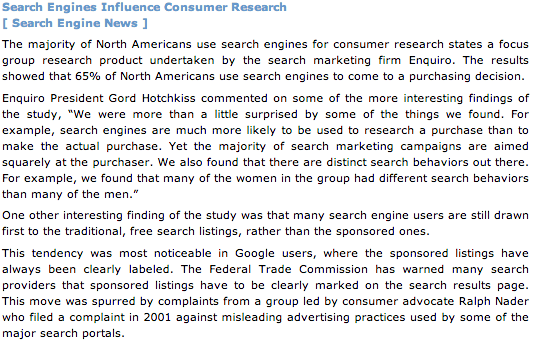 KJ: I don’t buy anything now without googling it first. But social media is huge now too. I’ve also bought things just because my friends on Facebook and Twitter (and Pinterest!) said they were awesome. Over 70% of survey respondents said they use online reviews (social media, websites) to influence their purchasing decisions. How do you think social media (and search engines) have transformed how we buy things, both online and off?
KJ: I don’t buy anything now without googling it first. But social media is huge now too. I’ve also bought things just because my friends on Facebook and Twitter (and Pinterest!) said they were awesome. Over 70% of survey respondents said they use online reviews (social media, websites) to influence their purchasing decisions. How do you think social media (and search engines) have transformed how we buy things, both online and off?
LB: 10 years ago the thought of shopping online was new, so was researching a product while in the buying phase. Remember, in 2004 a good amount of people also did not have cell phones… much less smart phones. So the ability to do a search on the fly, in the store, on the tablet, while in a meeting … etc., was not really something that was regularly done. Same thing with user generated content. Now, people search the web for research and reviews before purchasing. Reviews at the time were on a handful of sites, not spread everywhere.
Moreover, the last paragraph about the moves by the FTC warning search engines to label advertising is even more interesting. Remember how bad the search ads were in 2004? Now we have publishers buying ads, review sites buying ads and almost anyone buying advertising to bring in a targeted audience.
February 2004: “Search Engine Mamma.com Probed by SEC”
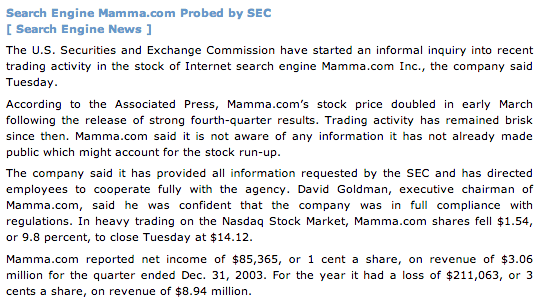 KJ: I just visited Mamma.com. It’s still live and kickin’. Its About page says:
KJ: I just visited Mamma.com. It’s still live and kickin’. Its About page says:
Mamma (www.mamma.com) was originally introduced as the first metasearch engine in 1996 and earned the title “mother of all search engines” because it aggregated and organized the web’s content from several of the leading search engines.
How do you think smaller search engines like this (as well as new ones in the past few years like Blekko.com and DuckDuckGo.com) influence the search engines of the next ten years?
LB: What’s funny about this is that Mamma.com was a comparison engine that was publicly traded before a lot of larger engines or technologies (like Google).
To answer your question about the influence of smaller engines or properties and their influence on major players is astounding.
- NorthernLight – It’s blue folders were one of the first offerings in categorical search
- AskJeeves – Semantic targeting and responses
- Ask.com – Universal Search
- Goto.com – Paid Search Listings, later acquired by Yahoo and became the model for Google AdWords
- Like.com – Visual search recognition that focused on shopping, now Google Shopping and honestly a forerunner to Instagram or other visual discovery offerings
- MSN Search / Bing – Late player to the game and keeps Google on its toes
May 2004: Hey Google, here’s some product thingys you should come out with!
Author Sushubh Mittal had some big ideas for Google. OK, so Google ISP, Google Desktop Email and Google Desktop Search didn’t pan out, but we think Larry and Sergey owe him some stock because Google Messenger and Google Browser are now a reality.
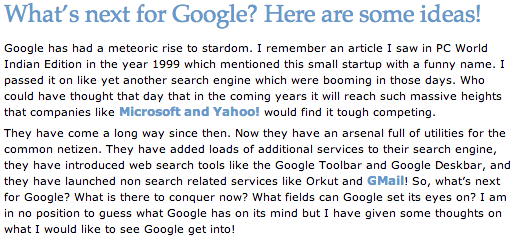 Excerpt:
Excerpt:
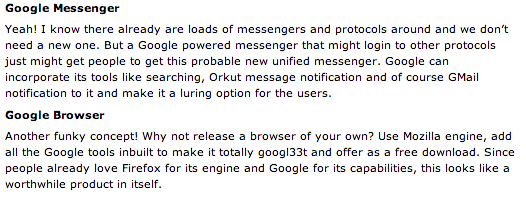 KJ: A funky concept for sure. I’m writing this post in Chrome right now, and I have Chrome as my Galaxy S4’s browser. One service I don’t think anyone could have predicted is Google Now. That service is rocking my world. It helped me be on time to a doctor’s appointment last week. What do you think is next for Google? A smartwatch?
KJ: A funky concept for sure. I’m writing this post in Chrome right now, and I have Chrome as my Galaxy S4’s browser. One service I don’t think anyone could have predicted is Google Now. That service is rocking my world. It helped me be on time to a doctor’s appointment last week. What do you think is next for Google? A smartwatch?
LB: We could all see it coming. As much as Google tried to distance itself from an operating system, it’s become a total player in the technology product market over 9 years. Except for my iPhone, I’m a huge Google Fanboy, I use Google for everything from Google Talk to Google Voice to Google Maps. When Google went after Mozilla and then struck deals with Opera, it was only a matter of time until they launched Chrome and owning their own browser gives them a two fold advantage; complete data and the power to serve what they feel is best for the user experience.
In terms of a smart watch, I think that’s a given. The acquisition of Motorola Devices was very underplayed but instantly made Google a competitor to Sony, Apple and every other device manufacturer. Wearables are the future, that’s a given, but instead of going after the every-person with a watch; Google chose Glass — a product for only a few Google chosen ones. But Google also has a track record of this… Google Wave (marketed to developers) was a precursor to Google+ and Google Talk. Google Desktop Search & Docs? Now they are Google Drive. I could see Glass technology simplified into transparent Bluetooth Headsets that have the same functionality.
BTW, Sushubh was the first employee at SEJ and introduced me to WordPress (b2 at the time) and the rest was history 🙂
June 2004: Yahoo Expands Free Mail to 100 MB
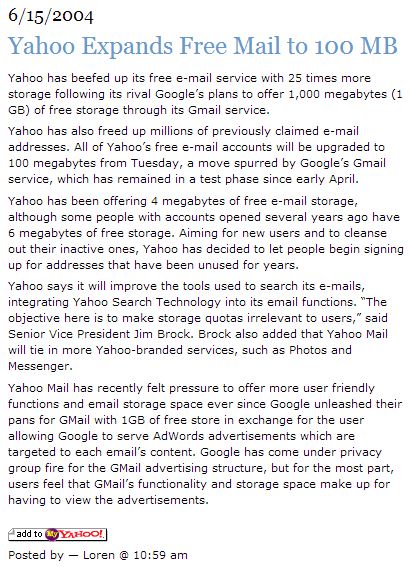
KJ: Oh man! 100 mb! Sweet! Google now gives 15gb (15,360 mb) away to all free gmail accounts. I remember when gb was becoming a thing. Now it’s terabytes. Do we really need all that storage? Terabytes take me into information overload. I can’t imagine I’d need to store a terabyte of information, unless I take thousands of photos on a 3 month cruise around the world or Muse releases 6,990 more albums (we would only be so lucky).
Will I be saying the same thing about Petabytes in 2022? How do you think the cloud has affected us as internet marketers?
LB: First of all, does anyone use Yahoo Mail anymore? Getting back to my previous point on Google testing, I think it’s now become obvious that GMail was a beta for Drive. We all live off the cloud and it’s become our central data refuge that’s not only powering our day to day applications, but also archiving our lives for us (in return for advertising data). Look at even Amazon and AWS… it’s slowly becoming the largest part of their business as well.
August 12, 2004: Avoid Search Engine Blacklisting
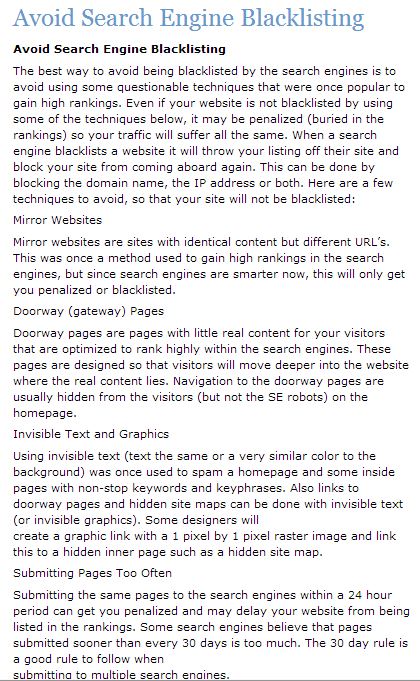
KJ: Still really relevant tips. I had a client ask me to submit his sitemap on Google Webmaster Tools daily a few years ago. I politely declined. If you had to rewrite this post now, what “new” blackhat techniques would you include?
LB: The website mirroring is something that also still happens a lot, although inadvertently. If I were to rewrite this post, I would focus on the illusion that more indexed pages is a good thing in Google. I work with a lot of marketplace and ecommerce clients who still believe, even after Panda, that the more the better.. when it’s exactly the other way around.
In terms of Blackhat Techniques to tell folks to stay away from, that would be the mass linking on the co citation level. If Majestic SEO can identify Trust Flow of inbound links, so can Google.
September 23, 2004: Google Browser May Become Reality
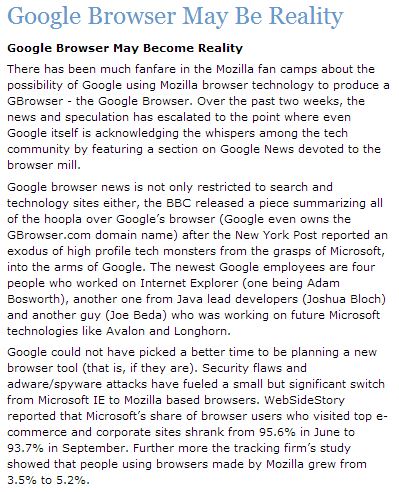
KJ: Chrome FTW. I love that Google knows my whole life and fills in contact information on websites based on my Gmail or other websites I’ve visited. However, this idea is still scary for some. How do you think Google’s foray into other extensions of online use has influenced the way we use it?
LB: I don’t know what’s scarier; Google launching a browser or Google launching a browser that’s so incredible that everyone wants to use it and they are dominating the market. Has Google’s expansion influenced the way we use it? Absolutely because people use Google now without even realizing it, especially with verbally driven audio search and mobile.. hence the Hummingbird update; so Google expanding beyond the search box has also influenced the ways that Google uses people 🙂
December 14, 2004: Desktop Search is the New Search Engine Battlefield
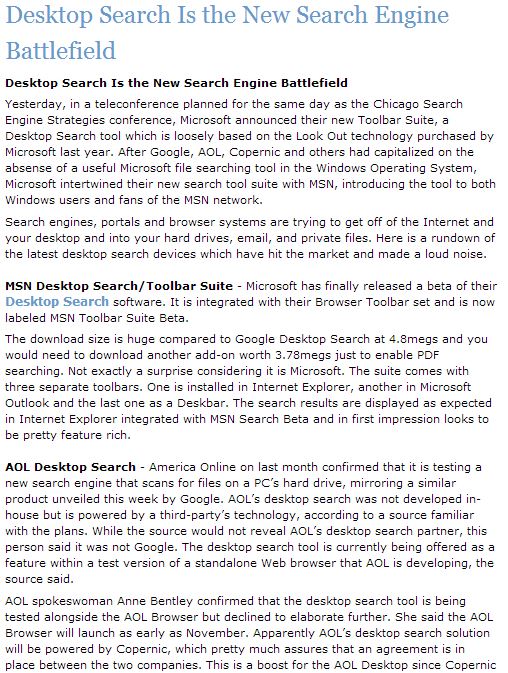
KJ: I’m glad this idea never caught on. It was just adding another step, especially if your browser was already open. However, with more programs and systems moving toward cloud storage, I’m guessing eventually all storage will be on the cloud and “desktop search” will again be a thing because our desktop is hosted on the cloud, and our computers will basically be monitors with keyboards. What do you think? Are articles on “desktop search SEO” in our future?
LB: Google Drive, Dropbox and other tools are essentially Desktop Search on the Cloud, so it’s worked. Google is making a big push for Drive archiving the desktop and its application being almost a default component of Drive. I would not be surprised if we start to see more Google Drive bundling in other Google apps for the desktop, laptop, tablet, phone and beyond.
What else was happening in the world in 2004:
- John Kerry secured the Democratic nomination on March 2nd. (George W. Bush ended up the victor.)
- Massachusetts was the first state in the US to legalize gay marriage.
- Martha Stewart was sentenced to 5 months in prison and fined $30,000 for insider trading.
- Sergey Brin and Larry Page became instant billionaires when the company opened their IPO in August.
all facts via Infoplease.
SEJ peeps: What SEO tactics were you using in 2004?



